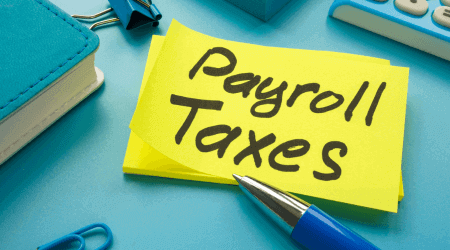***** article updated 1/27/2025 *****
Do payroll taxes feel like a mystery to you?
Are you unsure why your trucking company has to pay them or how to stay compliant?
You’re not alone. Many small trucking companies struggle to understand payroll taxes, but knowing the basics can save your business from costly fines, compliance headaches, and financial stress.
In this article, you’ll discover what payroll taxes trucking companies need to pay, why they matter, and actionable tips to simplify the process—so you can focus on keeping your business on the road.

Payroll Taxes Explained: What Trucking Companies Need to Know
Payroll taxes are the taxes employers pay based on the wages they give their workers. These taxes fund important programs like Social Security, Medicare, and unemployment benefits.
It’s also good to know that payroll taxes aren’t entirely on the employer. While you’re responsible for paying some of these taxes, part of the amount will also be withheld from your employees’ paychecks. This shared responsibility helps fund benefits that both employers and employees rely on.
Why Payroll Taxes Are Essential for Trucking Companies
You might wonder, “Why does my trucking company have to pay payroll taxes?” The answer is simple: as an employer, you’re responsible for helping fund programs that benefit your employees, such as social security benefits and unemployment insurance.
If your drivers are operating company-owned equipment, you should pay them as W2 employees. Paying employees as independent contractors (1099) when they should be W2 can lead to serious legal and tax issues. Following the correct process protects your business and ensures compliance with payroll tax laws.
Even if you’re a small trucking company with just a few employees, staying compliant is critical. Not paying these taxes or misclassifying employees can result in penalties, fines, or audits. Paying taxes properly helps keep your business running smoothly and worry-free.
Now that you know why payroll taxes matter, let’s talk about the specific taxes your trucking company needs to pay.
Types of Payroll Taxes Every Trucking Employer Must Pay
As a business owner, it’s important to know that the payroll taxes in this section are 100% your responsibility. These taxes are not funded by employee contributions, meaning you, as the employer, must pay them in full. Let’s take a closer look at each type of payroll tax.
FICA Contributions (Federal Insurance Contributions Act)
- What it is: FICA includes Social Security and Medicare taxes. These are federally funded programs for retirement and healthcare that benefit U.S. workers.
- How much: Both you and your employees share this tax. Each of you pays:
- Social Security: 6.2% of wages (up to $176,100 in 2025)
- Medicare: 1.45% of wages (no limit)
- Why it matters: Your contributions help your employees have security in retirement.
FUTA Contributions (Federal Unemployment Tax Act)
- What it is: FUTA funds federal unemployment programs that help workers who lose their jobs.
- How much: Employers pay 6% on the first $7,000 of each employee’s wages. If you pay your state unemployment taxes on time, you can get a credit that reduces this rate to 0.6%.
- Why it matters: It helps fund federal unemployment insurance programs.
SUTA Contributions (State Unemployment Tax Act)
- What it is: SUTA taxes are collected by states to fund state-level unemployment benefits.
- How much: Rates and wage bases vary by state. For example, some states stop taxing wages after an employee earns $10,000. In a few states, employees also pay part of this tax.
- Why it matters: Each state uses this money to help people who lose their jobs.
Step-by-Step Guide to Paying Payroll Taxes for Trucking Companies
Paying payroll taxes can feel overwhelming, but it’s simpler once you know the process. As an employer, you’ll need to follow these steps to stay compliant:
- Determine Your Deposit Schedule: The IRS will send you a Federal Tax Deposit (FTD) Frequency Notice to tell you whether to deposit your payroll taxes monthly or semi-weekly. This schedule is based on the total tax liability your company had during a specific lookback period.
- Make Your Deposits: You’ll deposit payroll taxes, including FICA and withheld federal income taxes, electronically through the IRS’s Electronic Federal Tax Payment System (EFTPS). This system ensures secure and timely payments.
- File Required Forms: Along with depositing taxes, you must also report them:
- Form 941: Filed quarterly to report FICA taxes and federal income tax withholding.
- Form 940: Filed annually to report FUTA taxes.
- State Forms: Check with your state for forms related to SUTA taxes.
Once you know how to pay payroll taxes, the next step is managing them effectively. In the next section, we’ll share strategies to help trucking companies like yours lower payroll tax costs and stay organized.
Proven Strategies to Reduce Payroll Taxes for Trucking Companies
Managing payroll taxes doesn’t have to be a burden. With the right strategies, you can reduce your tax liability and simplify the process for your trucking company.
- Use Per Diem: Paying employees a daily allowance for meals and travel reduces their taxable wages, lowering your payroll taxes.
- Keep Accurate Records: Track wages, hours, and deductions to ensure you pay the right amount of taxes.
- Outsource Payroll Services: Using a service like Superior Trucking Payroll Service can save you time and make sure your taxes are calculated and paid correctly.
By adopting these strategies, you can better manage payroll taxes and avoid common mistakes. Up next, we’ll explore some of the most frequent errors trucking companies make—and how to avoid them.

Avoid These Common Payroll Tax Mistakes in Your Trucking Business
By adopting these strategies, you can better manage payroll taxes and avoid common mistakes. Up next, we’ll explore some of the most frequent errors trucking companies make—and how to avoid them.
- Missing Deadlines: Late payments can lead to fines and interest charges, so it’s crucial to know your deposit schedule.
- Misclassifying Workers: Incorrectly classifying employees as independent contractors (1099) instead of W2 employees can result in significant penalties.
- Ignoring State-Specific Rules: Each state has unique unemployment tax requirements, and failing to follow them can cause compliance issues.
- Failing to Manage Funds Properly: Payroll taxes are not optional. Ensure you set aside funds so payments are made on time, as failing to do so can result in serious financial consequences for your business.
Avoiding these common mistakes is key to running a compliant and successful trucking business.
How to Simplify Payroll Taxes for Small Trucking Companies
Payroll taxes don’t have to be overwhelming. By understanding what they are, why they’re important, and how to manage them, you can make sure your trucking company stays compliant and avoids costly mistakes.
These taxes fund critical benefits like Social Security, Medicare, and unemployment insurance for your employees. Properly managing payroll taxes protects your business from penalties and ensures your team is taken care of.
If payroll taxes still feel complicated, don’t worry—you don’t have to handle them alone. Superior Trucking Payroll Service specializes in helping trucking companies like yours manage payroll taxes with accuracy and ease.
At Superior Trucking Payroll Service, we understand the challenges trucking companies face. Let us take payroll taxes off your plate so you can focus on what you do best—keeping your trucks on the road and your business moving forward.
Written by Melisa Bush
With over 15 years of experience in the trucking industry, Melisa is well-versed in the complexities of trucking payroll and adept at navigating special circumstances. Before joining Superior Trucking Payroll Service, Melisa worked at a trucking company, where she managed driver miles and expenses for a fleet of 50 trucks. This hands-on experience gives her unique insight into the challenges our clients face when preparing their payroll data.
Melisa’s top priority is customer service. She strives to treat each client as an individual with genuine needs, rather than just another number in the system. Her goal is to alleviate the burdens of our clients and make their daily operations smoother.

